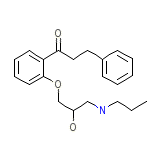Rythmol




Rythmol Brand names, Rythmol Analogs
Rythmol Brand Names Mixture
- No information avaliable
Rythmol Chemical_Formula
C21H27NO3
Rythmol RX_link
http://www.rxlist.com/cgi/generic3/propafen.htm
Rythmol fda sheet
Rythmol msds (material safety sheet)
Rythmol Synthesis Reference
No information avaliable
Rythmol Molecular Weight
341.444 g/mol
Rythmol Melting Point
No information avaliable
Rythmol H2O Solubility
Slightly soluble
Rythmol State
Solid
Rythmol LogP
3.34
Rythmol Dosage Forms
Tablet (150, 225 and 300 mg)
Rythmol Indication
Used to prolong the time to recurrence of paroxysmal atrial fibrillation/flutter (PAF) associated with disabling symptoms in patients without structural heart disease. Also used for the treatment of life-threatening documented ventricular arrhythmias, such as sustained ventricular tachycardia.
Rythmol Pharmacology
Propafenone is a Class 1C antiarrhythmic drug with local anesthetic effects, and a direct stabilizing action on myocardial membranes. It is used in the treatment of atrial and ventricular arrhythmias. It works by slowing the influx of sodium ions into the cardiac muscle cells, causing a decrease in excitablity of the cells. Propafenone has local anesthetic activity approximately equal to procaine.
Rythmol Absorption
Nearly completely absorbed following oral administration (90%). Systemic bioavailability ranges from 5 to 50%, due to significant first-pass metabolism. This wide range in systemic bioavailability is related to two factors: presence of food (food increases bioavailability) and dosage (bioavailability is 3.4% for a 150-mg tablet compared to 10.6% for a 300-mg tablet).
Rythmol side effects and Toxicity
Symptoms of propafenone overdose (usually most severe within the first 3 hours) may include convulsions (rarely), heartbeat irregularities, low blood pressure, and sleepiness.
Rythmol Patient Information
No information avaliable
Rythmol Organisms Affected
Humans and other mammals














